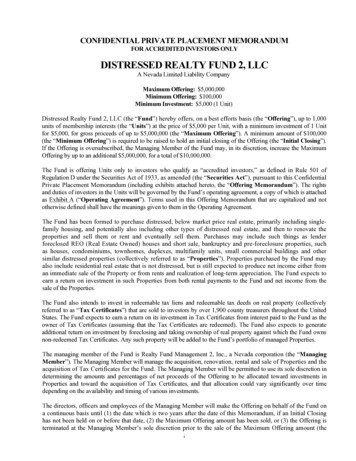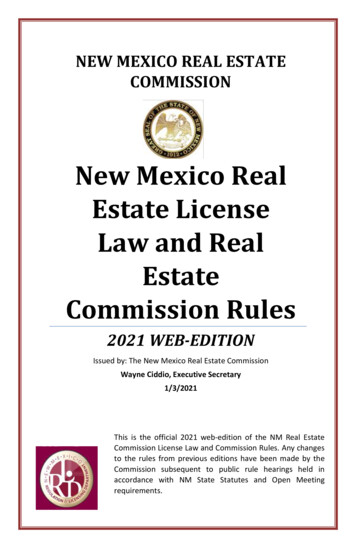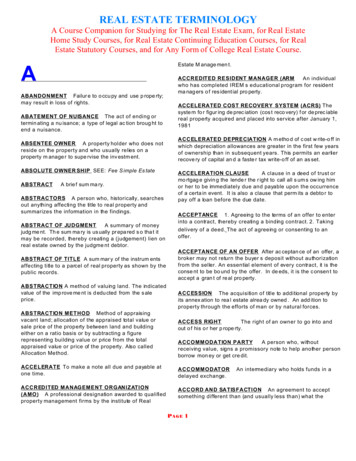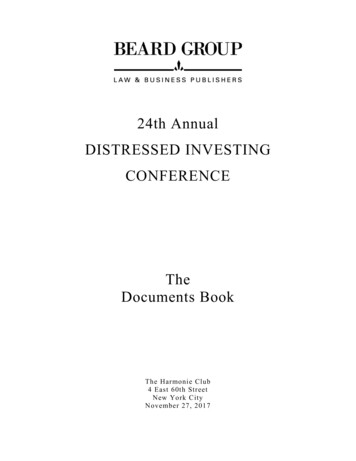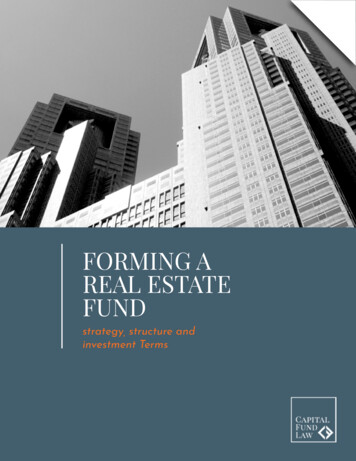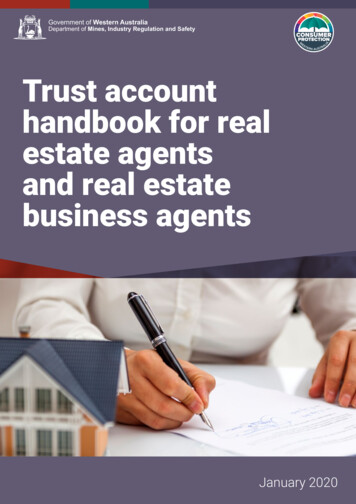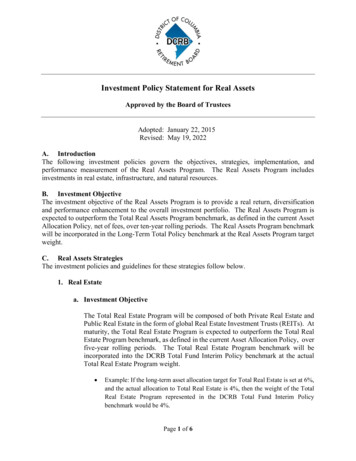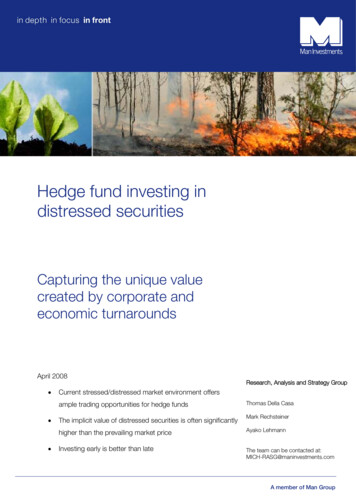
Transcription
Executive SummaryBMG DISTRESSED REAL ESTATE FUND I - 50,000,000 TARGETSummaryBMG’s principal investment fund has many years of successful experience in investing in differentclasses of real estate, businesses, hospitality, land development and investing in startups. With over 100years of collective experience of BMG’s executive team, we have formed Distressed Real Estate Fund, toinvest in distressed opportunities available in North America by acquiring current or defaulted mortgagenotes, foreclosure sales, bankruptcy sales, short sales or “fire” sales.The Fund plans to add value to and reposition each Asset to its highest and best use, when and asappropriate.The Fund will invest directly or indirectly through its trusted partners that have decades of experience inhospitality, single family portfolios and multifamily portfolios, industrial and commercial propertyoperators etc. All acquisitions will be sourced through bankruptcy sales, defaulted note sales, foreclosedbank properties or similar distressed situations.We expect the market to recover and stabilize by 2023. many financial industry analysts suggest that dueto the current economic crisis there will be hotel defaults and bankruptcies this year and in the comingtwo years, which will result in some key assets trading at far below even the current values andopportunity to hand pick them as they become available in the marketplace. Because of our long termrelationships with banks, finance companies, hotel brands, lawyers and brokers we have access toinventory before it hits the general market, and due to our extensive experience in turning around troubledhotels, we can handle and take on projects that are complicated and will deliver higher than averageresults.We have put together a selected group of experienced attorneys specializing in bankruptcies, bankruptcyexperts, Receivers and Trustees for foreclosures and real estate transactions along with experienced hotelmanagement companies, accountants and tax advisors.
IntroductionThe traditional intuitive definition of “distress” often refers simply to a company with too much debt andinsufficient cash flow to service the debt. However, more broadly speaking, financial distress may resultfrom one or more of the following causes: Excessive leverage due to a variety of causes. Declining profitability. Loss of competitive position. Changing business climate, whether in an industry, region or specific market. Regional or global economic disruptions, such as during the recent financial crisis. Lack of access to funding markets. Litigation or regulatory difficulties, including accounting improprieties, toxic torts or pollution controlliabilities.Some common risks investors face when investing in commercial real estate things such as loss oftenants, decreasing rent values, decreasing property values, and property repairs. Despite its name,investing in distressed real estate actually can, when done properly, reduce these risks and increaseprofits.Rather, Distressed Real Estate Investing consists of buying assets in unique real estate situations. Aproperty may be in pre-foreclosure or foreclosure, the owner may have a note that has a large lump sumcoming due, the property may have lost one of its key tenants, the property owner may have a collateralproblem with a different property that was pledged as collateral for the property being analyzed – thereare all kinds of such situations which would make a property “distressed.”Between the discount, the economic drivers, the massive room for property improvement, and the cashflow from the property, investors significantly reduce risk. Even if lease rates cannot be improved andthere is a slight market downturn, the asset can still have a positive return - a situation that really does notexist in traditional commercial real estate. If there is one definition of distressed real estate investing itwould be “buying secured real estate at significant discounts to market value to drive outsized returns.”There is a wide latitude to trade across the capital structure. Such securities may include bonds,debentures, notes, mortgage or other asset-backed instruments, equipment lease and trust certificates andcommercial paper. They may also acquire positions in equity and equity-related securities, includingpreferred stock, convertible preferred stock, common stock and warrants.Financial strategy
The Fund will invest directly or indirectly through its trusted partners that have decades of experience inhospitality, single family portfolios and multifamily portfolios, industrial and commercial propertyoperators etc. Acquisitions will be sourced through bankruptcy sales, defaulted note sales, foreclosedbank properties or similar distressed situation Projected annualized returns from fund to investors are projected to be 12% plus.Returns are based on rental income and potential increase in value over course of time.Fund will share 40% profits to investors and 60% to GP / Developers from rental / operatingincome and gains from sale of assets. Majority will be cash purchases with no debt, if debt is taken on it will not exceed 60% of projectvalue.Cash or income producing assets will be given a preference with strong potential upside in 5years. Management compensation fee is 2.5%Prior to any investment in properties or projects, a vetting process is to be done including thoroughinvestigation and analysis, site inspection, appraisals, engineering, property conditions report,environmental reports, market reports such as Smith Travel for hotel industry if asset is a hotel, etc.The life of the fund is ten years. Five-year commitment required, however if the investor wanted to exitprior to five years, a liquidation can be initiated with a 90 day notice from the investor after 3 years. Askthe fund manager for details.INVESTMENT CRITERIAOnce fully invested, the Fund’s portfolio is expected to be approximately allocated as follows: Number of Investments: At any given time, 70-80% of the Fund’s capital will be invested in (TBD)core projects. Percentage of Portfolio Allocated to Long (5 years or more) Investments: 55-85% Percentage of Portfolio Allocated to Short (3 years or less) Investments: 15-45% Individual Investment Exposure Limit: 20% Asset Class and Geographic Location Exposure Limit: 40%
Fund StrategyTarget investments that meet the Fund’ s investment objectives are often found in the following categoriesof opportunities:1. High quality RE assets trading at material discounts to their intrinsic (or net asset) value as2.3.4.5.determined by the Fund’s research process.Companies in or exiting bankruptcyDistressed Notes for operating businesses with significant hidden value in their real estate.Relative value opportunitiesCatalyst-driven short opportunities such as credit issues with major tenant(s), foreclosed assets,mismanaged assets etc.Investments that meet the Fund's objectives may occur in distressed debt, liquidations, companies in orexiting bankruptcy, foreclosed or creditor owned or controlled companies and assets and other specialsituations.Target DistributableYieldAll dividends from investments made by the Fund will be reinvested intothe Fund.LiquidityInvestors can liquidate their investment any time after 36 months.Withdrawals will be processed on a quarterly basis, subject to a three monthnotice period.Sponsor CapitalA minimum of 10% of the total equity contributions.Tax DocumentK-1StructureInvestors will invest in Black Mountain Distressed RE Fund, LP (BMDRF). BMDRF will be managed byBlack Mountain Group DF Manager, LLC. The Fund will have separate investment vehicles tailored tothe tax and/or regulatory needs of different asset classes. The Fund will invest in corporations,partnerships, limited liability companies, or other entities (“Operating Entities”) in which BMDRF willhave a direct interest. Cash derived from the operation, financing, sale or other disposition of investmentswill be distributed by the Operating Entities to the applicable Fund investment vehicles comprising theFund, which will in turn distribute such cash (less the applicable incentive compensation) pro-rata toinvestors.Key Principals
CARLOS J. BONILLACarlos J. Bonilla practices real estate law and has been heavily involved in a broad range of legalissues affecting large scale projects. Mr. Bonilla managed an international real estate company doingbusiness throughout Latin America and Asia. Mr. Bonilla represents large real estate investment groupsdoing business in Canada, Brazil, Costa Rica and the United States, drafting contracts, legal due diligencefor large investment transactions and real estate closings.Mr. Bonilla has worked on acquisition and rezoning of large tracts of land in Florida; acquisition,entitlements and design of large hotel projects, condominium documentation, and management issues.Mr. Bonilla is a graduate of the University of Miami School of Law, and obtained an advanced degree(LL.M.) in Real Property Development in 2005. He is a member of The Florida Bar and is a Fellow of theFlorida Bar Foundation. He is also a member of Phi Delta Phi International Legal Fraternity. He activelysupports philanthropic associations. Mr. Bonilla is a Florida Real Estate Licensee, and is a member of theKnights of Columbus, St. Jude Council, in Orlando, Florida. Mr. Bonilla is fluent in English and Spanish.SYED RAZAHospitality industry executive with over 30 years multi-unit hotel experience in operations,distressed hotel turnarounds, investing, design & construction from ground up. Also extensive &diversified experience in commercial real estate, national food distribution, industrial warehouses, foodoutlets, nutraceuticals, E-Commerce, finance, electronic payment processing, wellness & fitness,technology, recycling and farming.Mr. Raza has been appointed as a CRO - Chief Restructuring Officer for several hotel bankruptcycases in the Middle District of Florida. Served as Receiver for State Court appointed hotel case.Moderated and participated on several hospitality panels. Presented revenue management techniques andbest E-commerce practices at brand conferences for various hotel chains.Managed multiple investments in real estate, health & fitness, technology, finance, paymentprocessing, farming, land development and land banking, nutraceuticals, skin care, logistics anddistribution companies.Mr. Raza has Bachelors degree in Business Administration and Masters in Arts from SindUniversity. Also is a member of American Bankruptcy Institute, Asian American Hotel OwnersAssociation, Turnaround Management Association. Mr. Raza has been involved in several localcommunity development projects in the Tampa area, social and philanthropic projects in variouscapacities. Fluent in English, Urdu, Hindi with basic working knowledge of Arabic and Punjabi.Currently resides in Montenegro with his wife and two children.Advisory BoardChester Robert Gala - Real Estate Analyst - Bachelor Business Administration- Harvard University &Masters in Science Real Estate Development- Columbia UniversityDan Harper - 46 Years as RE Investor and Developer
investing in distressed real estate actually can, when done properly, reduce these risks and increase profits. Rather, Distressed Real Estate Investing consists of buying assets in unique real estate situations. A property may be in pre-foreclosure or foreclosure, the owner may have a note that has a large lump sum
